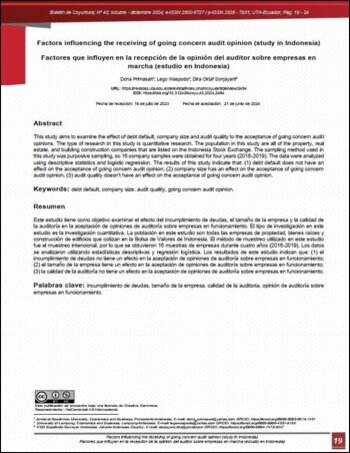Factors influencing the receiving of going concern audit opinion (study in Indonesia)
Main Article Content
Abstract
This study aims to examine the effect of debt default, company size and audit quality to the acceptance of going concern audit opinions. The type of research in this study is quantitative research. The population in this study are all of the property, real estate, and building construction companies that are listed on the Indonesia Stock Exchange. The sampling method used in this study was purposive sampling, so 16 company samples were obtained for four years (2016-2019). The data were analyzed using descriptive statistics and logistic regression. The results of this study indicate that: (1) debt default does not have an effect on the acceptance of going concern audit opinion; (2) company size has an effect on the acceptance of going concern audit opinion; (3) audit quality doesn't have an effect on the acceptance of going concern audit opinion.
Downloads
Article Details

This work is licensed under a Creative Commons Attribution-NonCommercial 4.0 International License.
![]()
The publications of the Boletín de Coyuntura are licensed under a Creative Commons Attribution-NonCommercial 4.0 International License (CC BY-NC 4.0). The Universidad Técnica de Ambato retains the copyright of the published works, and favors and allows the reuse of these, as long as: the authorship and original source of publication is cited, and they are not used for commercial or onerous purposes. The intellectual property of the published articles belongs to the authors.
References
Chen, K. C., & Chruch, B. K. (1992). Default on Debt Obligations and the Issuance of Going-Concern Report. Auditing: A Journal Practice and Theory, Vol.11 No.2, 30-49.
CNN Indonesia. 2018. Kasus SNP Finance, Bank Mandiri Pidanakan Deloitte Indonesia. https://www.cnnindonesia.com/ekonomi/20180925191223-78-333175/kasus-snp-finance-bank-mandiri-pidanakan-deloitte-indonesia, diakses tanggal 6 September 2019.
Craswell, A. T., Francis, J. R., & Taylor, S. L. (1995). Auditor Brand Name Reputations and Industry Specializations. Journal of Accounting and Economics, 297-322.
DeAngelo, L. E. (1981). Auditor Size and Audit Quality. Journal of Accounting and Economics, 183-199.
Dewayanto, T. 2011. Analisis Faktor-faktor yang Mempengaruhi Penerimaan Opini Audit Going Concern pada Perusahaan Manufaktur yang Terdaftar di Bursa Efek Indonesia. Fokus Ekonomi, Vol. 6 No. 1, 81-104.
Dewi, I., & Latrini, M. (2018). Pengaruh Financial Distress dan Debt Default pada Opini Audit Going Concern. E-Jurnal Akuntansi Universitas Udayana, Vol. 22, No. 2, 1223-1252.
Eisenhardt, K. M. (1989). Agency theory: An assessment and review. The Academy of Management Review Vol 14 No.1, 57–74.
Foroghi, D. (2012). Audit Firm Size and Going Concern Reporting Accuracy. Interdiciplinary Journal of Contemporary Research in Business, Vol. 3, No. 9.
Harris, R., & Merianto, W. (2015). Pengaruh Debt Default, Disclosure, Opini Audit Tahun Sebelumnya, Ukuran Perusahaan dan Opinion Shopping Terhadap Opini Audit Going Concern. Diponegoro Journal of Accounting, Vol. 4 No. 3, 2337-3806.
Januarti, I. (2009). Analisis Pengaruh Faktor Perusahaan, Kualitas Auditor, Kepemilikan Perusahaan Terhadap Penerimaan Opini Audit Going Concern (Perusahaan Manufaktur yang Terdaftar di Bursa Efek Indonesia). Simposium Nasional Akuntansi 12 (SNA 12), Palembang: 4-6 November.
Jensen & Meckling. (1976). The Theory of The Firm: Manajerial Behaviour, Agency Cost, and Ownership Structure. Journal of Financial and Economics Vol. 3, 305-360.
Joanna, L. H. (1994). The Effect of Experience on Consesus of Going Concern Judgement. Behavioral Research in Accounting, Vol 6.
Khaddafi, M. (2015). Effect of Debt Default , Audit Quality and Acceptance of Audit Opinion Going Concern in Manufacturing Company in Indonesia Stock Exchange. International Journal of Academic Research in Accounting, Finance, Vol. 5 No.1, 80-91.
Kholifah, S. (2015). Effect of Quality Audit, Opinion Shopping, Debt Default, Growth Companies and Financial Conditions to Acceptance of Audit Opinion Going Concern. Journal of Accounting Vol.1 No.1, Fakultas Ekonomi Jurusan Akuntansi Universitas Pandanaran.
Koh, H. C., & Tan, S. S. (1999). A Neural Network Approach to the Prediction of Going Concern Status. Accounting and Business Research Vol.29 No.3, 211–216.
Ruiz-Barbadillo, E., Gomez-Aguilar, N., De Fuentes-Barbera, C., & Garcia-Benau, M. A. (2004). Audit quality and the going-concern decision-making process: Spanish evidence. European Accounting Review, 13(4), 597–620.
Venuti, E. K. (2007). The Going Concern Assumption Revisited: Assessing a Company’s Future Viability. The CPA Journal Online.


